The new age of AI and machine learning is reminiscent of the level of buzz and activity the region saw in the late 1990s and early 2000s for telecom, networking, and the World Wide Web. So says Dr. Gopal Gupta, professor of computer science in the Erik Jonsson School of Engineering and Computer Science, Erik […]
Category: Research
How the Region’s Top Innovators Are Using AI and ML to Solve Business Challenges

Dr. Xiaohu Guo and his Collaborators Awarded the ACM SIGGRAPH 2023 Technical Papers Best Paper Award
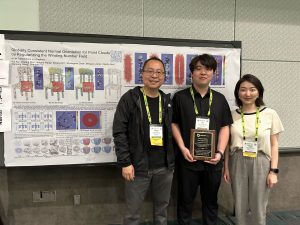
This August, Dr. Xiaohu Guo, his PhD student Ms. Ningna Wang, and a team of collaborators received the Association for Computing Machinery (ACM) Special Interest Group on Computer GRAPHics and Interactive Techniques (SIGGRAPH)’s Technical Papers Best Paper Award for the paper titled “Globally Consistent Normal Orientation for Point Clouds by Regularizing the Winding Number Field.” ACM SIGGRAPH is a special interest group within ACM, and SIGGRAPH 2023 is the premier conference for computer graphics and interactive techniques worldwide. The ACM SIGGRAPH community is a global nonprofit organization serving the evolution of computer graphics and interactive techniques. With thousands of members across the world, the researchers, artists, developers, filmmakers, scientists, and business professionals of ACM SIGGRAPH are building the future of digital art and interactive design.
Tom Vazhekatt creates a groundbreaking Routora app that offers an optimized alternative to conventional route maps
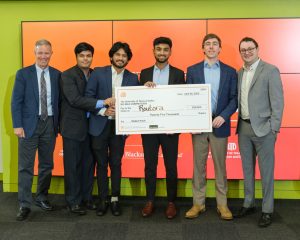
Tom Vazhekatt, a 4th-year Computer Science major, is the Co-Founder and CEO of Routora, a route planning tool that finds the fastest and most efficient route when you have multiple stops. Tom was a Dallas native attending high school in Coppell, where he was first introduced to Computer Science. During quarantine, Tom used the time to enhance skill sets that enabled him to build several personal projects to help him with daily needs. He came to realize that if he could build solutions for himself, he could also do so for other people.
Team’s New AI Technology Gives Robot Recognition Skills a Big Lift
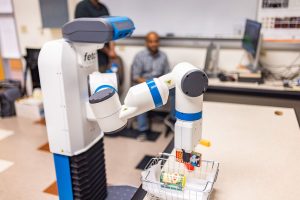
A robot moves a toy package of butter around a table in the Intelligent Robotics and Vision Lab at The University of Texas at Dallas. With every push, the robot is learning to recognize the object through a new system developed by a team of UT Dallas computer scientists.
The new system allows the robot to push objects multiple times until a sequence of images are collected, which in turn enables the system to segment all the objects in the sequence until the robot recognizes the objects. Previous approaches have relied on a single push or grasp by the robot to “learn” the object.
Elevating Education: A Conversation with Bhavani Thuraisingham, Taylor L. Booth Education Award Winner
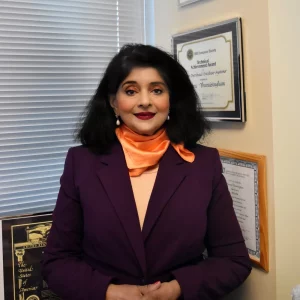
Via IEEE Computer Society – Bhavani Thuraisingham’s impact transcends excellence within education, as she has made countless efforts within bridging the gaps between industry and academics. Additionally, she is the Founders Chair Professor of Computer Science, the Founding Executive Director of the Cyber Security Research and Education Institute (2004-2021), and the Co-Director of the Women in Cyber Security and Women in Data Science Centers at the University of Texas at Dallas. She is also a visiting senior research fellow at King’s College, the University of London.
UT Dallas CS Department Hosts 2023 Computational Geometry Week
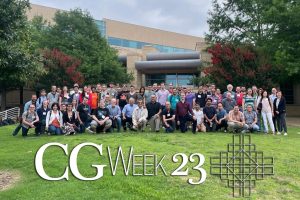
The UT Dallas CS Department hosted Computational Geometry Week (CG Week), a premier international forum for advances in computational geometry and its many applications, from June 12-15, 2023. CG Week combines a number of events, most notably the 39th International Symposium on Computational Geometry (SoCG 2023), the associated Media Exposition (CG:ME), workshops, and the Young Researchers Forum (CG:YRF). The conference provided a platform for researchers, scientists, and engineers in academics and industry to present their current findings in the emerging areas of computational geometry and its many applications.
Team’s AI Tool May Predict Cardiac Arrests in Pediatric Patients
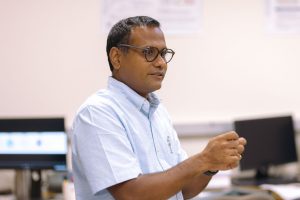
Team’s AI Tool May Predict Cardiac Arrests in Pediatric Patients University of Texas at Dallas researchers have developed an artificial intelligence tool that could predict the risk of cardiac arrest in children hospitalized in cardiac intensive care units. The technology is the latest work from the Statistical Artificial Intelligence and Relational Learning Group, a UT […]
UT Dallas Joins National Effort to Respond to Cyber Attacks on Public Infrastructure
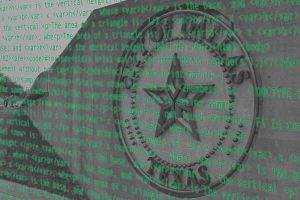
Via Kera News – Early last month, the city of Dallas was hit with a ransomware attack by the hacker group Royal, which impacted a number of its websites. This is photo illustration of computer code over the city of Dallas emblem.
UT Dallas last week announced it’s joining a nationwide collaboration to research how to make network-connected infrastructure — including self-driving cars, drones and Wi-Fi-connected trains — more resilient to cyber attacks.
UT Dallas Joins New USDOT National Cybersecurity Center To Help Protect Connected Vehicles, Drones, and More
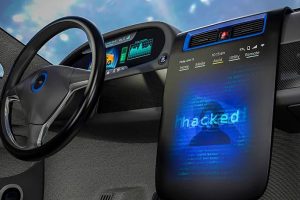
Via Dallas Innovates — TraCR—slated to receive $20 million from the DOT over five years—will use everything from adversarial machine learning to blockchain to help fight cyberattacks on our transportation system.
From new cars and autonomous vehicles on our roads to drones in our skies, America’s transportation system has become increasingly connected—and dangerously vulnerable to cyberattacks. Now UT Dallas is joining an effort to patch up those vulnerabilities through the newly formed National Center for Transportation Cybersecurity and Resiliency.
University Joins National Transportation Center in Cybersecurity

The University of Texas at Dallas recently joined a multi-university transportation center focusing on cybersecurity that is sponsored by the United States Department of Transportation (USDOT). Clemson University, the lead university of this center, invited UT Dallas to join its proposal team due to the exceptional expertise UT Dallas has developed in cybersecurity and privacy over the past 20 years. The center will receive $20 million from the USDOT for 5 years to provide novel solutions to problems faced by the transportation industry.




